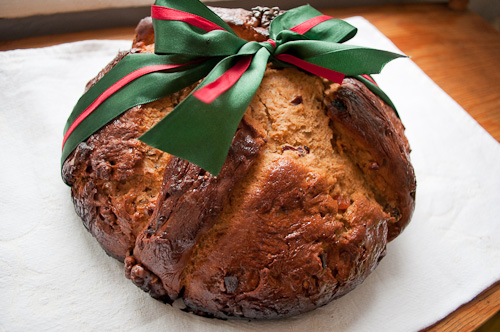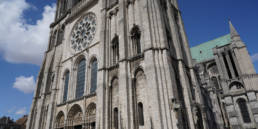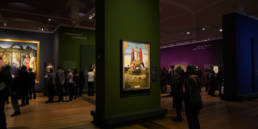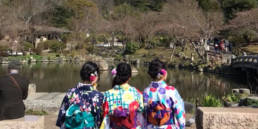For Greeks, Easter is a more important tradition than Christmas. The majority of Greek Orthodox followers see Christmas as a secondary holiday, and this is reflected in the way that Greek traditions have been somewhat watered down by international festive ideas. For example, the Greek tradition involves decorating a model ship, but now many homes feature a Christmas tree. Where other countries celebrate with gifts on December 25, Greeks give presents on New Year’s Eve, and another important day during the holiday season is December 6, the feast day of the country’s patron Saint, Nicholas (who protects sailors).

The Model Ship (Karavaki)
The decoration of a wooden model ship, the Karavaki, with Christmas lights is an old Greek custom that is still alive in the Islands, particularly the Cyclades, such as Santorini. It stems from carol-singing children who walk door to door bearing small wooden boats. The children sing Kalanda (Christmas carols) and in return receive treats that they store inside the boats. These boats are placed near a door, pointing inwards to symbolize the sailors’ safe journey home. Christmas trees are a modern addition in many homes, but slowly, people are turning back towards the older traditions or a mix of the two. For example, Thessaloniki, Greece’s second city in the North, erects both a ship and a tree every year.
Christmas Feasting

Many people in Greece will fast for 40 days in the run up to Christmas. The fasting period starts on November 15 and ends on December 24 in the evening after the first star is seen in the sky. On Christmas Day the tradition used to be roast pork to break the fast, but now turkey is becoming popular. Christopsomo, a light buttery bread filled with warming cloves, cinnamon and orange is made on Christmas eve and decorated with a cross. Each region has its own versions, in Crete the Christopsomo is sprinkled with sesame seeds. Kourabiethes are small shortbread cookies that are baked in every home and melomakarona, a biscuit drenched in honey are the epitome of Christmas cooking in Greece. Always handmade especially in the islands they are offered to everyone who visits.
Island Traditions

Each island has its own peculiarities at Christmas, like in Kefalonia, where women burn incense at the door to keep away kallikantzari, the mischievous elves that appear on earth for 12 days over Christmas. On the Cycladic Island of Tinos, a meal on December 25th is held for only men and the priest. In the northern town of Kastoria, a huge carnival, the Ragoutsaria, is a three-day feast for the senses, with dancing, music and (a lot of) wine that dates back to pagan times. The most famous islands like Mykonos and Santorini’s celebrations are a quieter affair, with a huge focus on traditional food. The traditional dip of fava takes a leading role; the broad beans are grown and used locally. Traditional Santorini tomato meatballs (no actual meat involved!) are served with the island’s famous, delicious wine Vinsanto. Few tourists have the pleasure of tasting this feast because most of the luxury hotels for which Santorini is so well known tend to rest until April when the tourist season reopens.
Christmas Day and New Years Eve
Instead of gifts, on Christmas Day there is a huge family feast. Children have to wait until January 1st to get their hands on some gifts. New Years Day is the feast day of Agios Vassilis (otherwise known as Santa Claus) and is the day that families share their presents. New Years Day has another food tradition with the Vassilopita, a cake with a lucky coin or flouri baked inside. Finding a coin in your slice symbolizes good luck for the following year.
January 6 – Epiphany

The most significant celebration of the Orthodox Church is Epiphany on January 6. It marks Christ’s baptism by John the Baptist. On this day, priests go to the closest body of water, preferably the sea or a lake, and throw a cross in. Volunteers (usually young men) dive in, in the hopes of finding it. Whoever finds the cross first will be blessed with good luck for the rest of the year.
Sign up to receive future blog posts by email
Zoe
Zoe Mouchritsa lives in Athens and specialises in finding the best and brightest things to do in this lively city and throughout Greece. After completing a BA in Applied Informatics and Multimedia in beautiful Crete, she jumped full time into blogging and is now editor for WhiteAndBlue.gr.
Related Posts
September 18, 2019
Re-Discovering Chartres: the Gothic Cathedral and Beyond
March 31, 2019
Mantegna and Bellini – Berlin exhibition review
May 1, 2018




